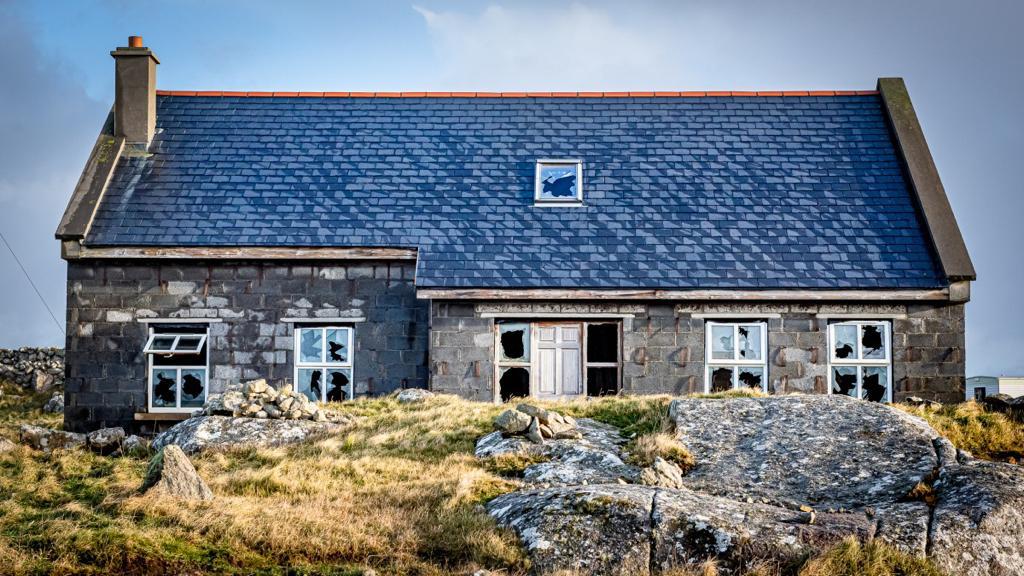An earlier version of this article was recently published in the Irish World newspaper, we commend the courage of the editor Bernard Purcell for doing so, but a week is a long time in politics and we felt it required updating and a short addendum on the possibility of a legal challenge.
Indirectly, the failure to deal with the issue of housing and homelessness has led to the rise of far-right protests, targeting immigrants in temporary accommodation. This is the slippery slope to fascism.
Housing is the defining issue of this Irish generation. By extension, it is the defining issue of Ireland’s next general election.
One slender thread of hope to ensure matters did not decline further was Ireland’s temporary ban on evictions. But that has been rescinded.
In contrast, Scotland had the good sense to extend its own evictions ban until September. But in the midst of the worst housing shortage in the country’s history, the Irish government is prioritising the financial interests of landlords.
Ireland’s recently appointed Attorney General Rossa Fanning SC had advised the Irish government that landlords’ groups could mount a constitutional challenge to the extension of the ban. But the Irish government subsequently insisted its decision to revoke the evictions ban was a political one, rather than one based on the AG’s advice.
Nevertheless, the Irish governments have frequently hidden behind the issue of constitutionality. It’s the first line of defence whenever the question of genuine rent control is proposed, and the last line of defence when the calls for the introduction of the eviction ban were first made.
Frank Armstrong explores the historical origins of capitalism, as the steady financialisation of property threatens the good life we have a right to expect.https://t.co/Lq7z4PeWCP@broadsheet_ie @BowesChay @liamherrick @williamhboney1 @KevinHIpoet1967 @VillageMagIRE @RoryHearne
— CassandraVoices (@VoicesCassandra) September 15, 2021
Constitutional Problem?
We believe there is a constitutional solution to a supposedly intractable constitutional problem. The origin of the problem is that in Blake v Madigan (1982) The Rent Restrictions Act 1960, (1981) limited the amount of rent which could be charged on certain controlled dwellings.
It also made it difficult for a landlord to recover possession of a dwelling affected by the legislation. Landlords argued that the legislation amounted to an unjust attack on their property rights.
The Irish Supreme Court agreed, referring to how the scheme operated in an arbitrary manner, with no means testing of either landlord or tenant, and that no compensation was available for the restriction of the property rights of the landlords affected.
So, under the Constitution, the right to property is to be protected against “unjust attack and the landlords’ rights unjustly attacked.”
But constitutionally, this idea of an unjust attack is subject to the proviso that the rights of landlords must give way to the common good – where the legislature is informed by Directive Principles of Social Policy set out in Article 45 – and also that the means used to intrude on property rights are proportionate.
During the pandemic, in July 2020 the government introduced an Act allowing banks and Vulture funds to use hearsay evidence to citizens' great disadvantage.https://t.co/rc0ioaYyUk@broadsheet_ie @WhistleIRL @BowesChay @paddycosgrave @VillageMagIRE @RoryHearne #vulturefunds
— CassandraVoices (@VoicesCassandra) February 19, 2022
Social and Affordable Housing
The social justice and common good arguments for maintaining an eviction ban are, in our view, overwhelming. But, of course, this would limit and restrict the property rights of landlords in an increasingly neoliberal Ireland.
Compulsory purchase schemes have, however, been upheld in such cases as Dreher [984], with the suggestion that sometimes there is no need to pay any compensation.
In Re Article 26 and Part V of the Planning and Development Bill [2000] 2 IR321, Part V of the Bill aimed to provide affordable housing and social integration, imposing a condition that planning permission for residential developments would either have to cede some of the development for affordable housing, or instead pay compensation.
There was no requirement that the State pay compensation to the developer under the scheme, which was upheld by the Supreme Court in a judgment which focused largely on the reasons for the restriction on property rights.
The Court noted that the restriction on property rights was justified and proportionate to the objectives of the Bill.
Based on this precedent, today the government could acquire properties at less than market rates, paying a measure of compensation to the landlords and thus avoiding the unappealing vista of increased homelessness, leading to further social divisions further social divisions, and creating conditions for the rise of a far-right fascism, which may serve the interests of this neoliberal coalition, and its apologists.
It could also have a welcome deflationary impact on the price of property which now exceed Celtic Tiger levels.
The land question has haunted Irish politics since time immemorial. Frank Armstrong attributes the current acute housing crisis to the colonial settlement.https://t.co/7Qp4K5wQrr@broadsheet_ie @BowesChay @vincentbrowne @connolly16frank @caulmick @RoryHearne @fallon_donal
— CassandraVoices (@VoicesCassandra) August 17, 2021
Shared Equity
Alas, it appears the Irish government does not want this and has proposed an alternative. They are currently drawing up legislation which in effect will extend their Shared Equity scheme to second hand homes where the landlord wishes to sell but has a tenant in situ.
The drive to introduce this Shared Equity scheme came from the two main property lobby groups – Property Industry Ireland and the Irish Institutional Property.
Neither group came up with the idea itself. It is based on an English scheme which research by the London School of Economics (LSE) found pushed up London house prices by 9per cent.
In effect, it operates as a dual mortgage, whereby the tenant in situ would have a mortgage to a bank and also be required to repay the State who would take an “equity stake” in the property.
This is unlikely to work, or even be ready in time, for the forthcoming wave of Irish evictions. A simpler proposal is to follow the South African model of amending the Constitution to include an enforceable right to housing in an emergency context.
The Irish government’s promise of a housing referendum has foundered on a disagreement about the wording. We suspect that it will not implement what is needed for an immediately enforceable emergency housing right, as is enforceable in other jurisdictions.
The failure of the #JustSociety movement within #FineGael was a turning point in Irish history. David Langwallner recalls the contradictory career of Declan Costello.https://t.co/RdNsjfXqJX@broadsheet_ie @ConorBlenner @vincentbrowne @LumberBob @KevinHIpoet1967 @liamherrick
— CassandraVoices (@VoicesCassandra) May 11, 2020
A Just Society?
We doubt the present government has the political will for meaningful action on housing. But there is an alternative, which is to launch a constitutional challenge so the Supreme Court can recant on such nefarious cases as O’Reilly v. Limerick Corporation [1989] in which Mr Justice Declan Costello (1926-2011) held that he lacked jurisdiction to compel the defendant to provide the plaintiffs with adequately serviced halting sites, because this was a question of distributive justice.
Such matters of social justice, he intimated, were for Leinster House, not the Four Courts. Importantly, he recanted the O’Reilly decision a few years later in the case of O’Brien v Wicklow UDC [1994].
Costello (1926-2011), the son of former Taoiseach John A Costello, was a former Fine Gael TD, Attorney General, barrister and judge, who served as President of the Irish High Court from 1995to 1998.
As a politician he was the author of Towards a Just Society, a policy document which shifted Fine Gael towards the left and social justice, and which made Fine Gael a more attractive coalition partner for the Irish Labour Party.
Costello also created Ireland’s Office of the Director of Public Prosecutions and the Law Reform Commission, making him the most effective and consequential Irish Attorney General in the history of the State.
He was a thoroughly decent man, and a visionary, but also a product of his background. Fine Gael has long since parted company with Costello’s vision of the Just Society for Ireland. Just like Fianna Fáil, it has been completely captured by business interests, landlords and property developers.
Their politics is little more than the shadow cast upon society by big business, as the American philosopher John Dewey (1859-1952) might have said.
The portents for a constitutional challenge in this period of an unprecedented housing emergency are not, however, all bad. In a fledgling way recent judgments have hinted at a more interventionist approach, in proportionate terms where there is recklessness or bad faith.
Well, if throwing people out on the street, disrupting family units with no affordable place to go, is not reckless, what is?
The very fabric of Irish society frays, as dust is left to gather on those copies of Just Society which remain shelved and unread in Fine Gael’s basement.
The current crop of Fine Gael TDs have no interest in reading that document, but are happy to deploy it for public relations purposes when it suits them.
Last week Sinn Féin forced a vote on the government’s lifting of the eviction ban, which led to one Green T.D.’s Nessa Hourigan breaking ranks and voting against the government.
As the doomsday scenario for terrified tenants looms large, and the Irish government looks on with complete indifference to such pain, we are reminded of the word of a Christy Moore song- “the spirit that dwelt within, now sleeps out in the rain”.
"The Harp needs more than tuning. The single most important and useful change we should make to our Constitution is to remove the first paragraph of Article 45…"
Recalling an important article from 2018 by Eoin Tierneyhttps://t.co/NZ5U8ODAYo@paddycosgrave @cilliandoyle87— CassandraVoices (@VoicesCassandra) March 29, 2023
Addendum
With the government’s rejection of last week’s motion from Sinn Féin to extend the eviction ban, and with the help of certain “independent” TDs, the same result is now likely to be reached today. The Labour Party’s no confidence motion has also fallen short.
This government and its drive to break all homelessness records is bruised and battered, but not unbroken. In our view the last remaining hope for the thousands facing eviction rests upon the kind of last-minute legal challenge our initial article set out.
Papers could potentially be lodged on Thursday seeking an interim injunction for violations by the government of Article 43, Article 40.3 and Article 45 of the constitution. This will require state-sponsored lawyers to show cause, and seek a return date for a fully-fledged interlocutory hearing with skeleton arguments and detailed consideration.
The logic is that the implementation of the lifting of the eviction moratorium on Friday would not happen as mandatory relief and an injunction would be sought against the lifting. This would require careful judicial consideration, and thus time for cool judicial heads to resolve whether it could be secured.
If a lawyer cannot be enabled to seek an interim injunction on such short notice any member of the public can do so.
However, a powerful symbol would be the representatives of the opposition in Dáil Eireann coming together, in conjunction with some of those currently facing eviction, to try and avert the inevitable prospect of a humanitarian catastrophe on our streets in the months to come.
A new Socialist Lawyers’ Association of Ireland announced its establishment in January of this year, so perhaps they might even want to lend a hand. There are also organisation likes CATU and other campaigning groups. But time is of the essence.
Our conservative political classes seem to have either sleep-walked or deliberately created this unprecedented housing crisis and its dysfunctional property market. Sterile and detached cost benefit analysis where households are units and people products lead to the increasing dehumanisation of those impacted by policy decisions.
Even the most basic rights we can think of like housing and a safe and secure upbringing seem to wither on the vine. To quote someone who Fine Gael should know well:
“We are not living in a just society. This fact must be understood, and complacency must be dispelled, and enthusiasm created to remedy the social injustices in our midst.”
Those are the words of the late Declan Costello former Fine Gael TD, Attorney General and author of the “Just Society”. They seem to ring truer than ever.
The time has come for a Housing challenge, for we the people.
David Langwallner is an Irish Barrister based in London. Cillian Doyle is a political economist and policy advisor. The views expressed are their own.
Feature Image: Daniele Idini




